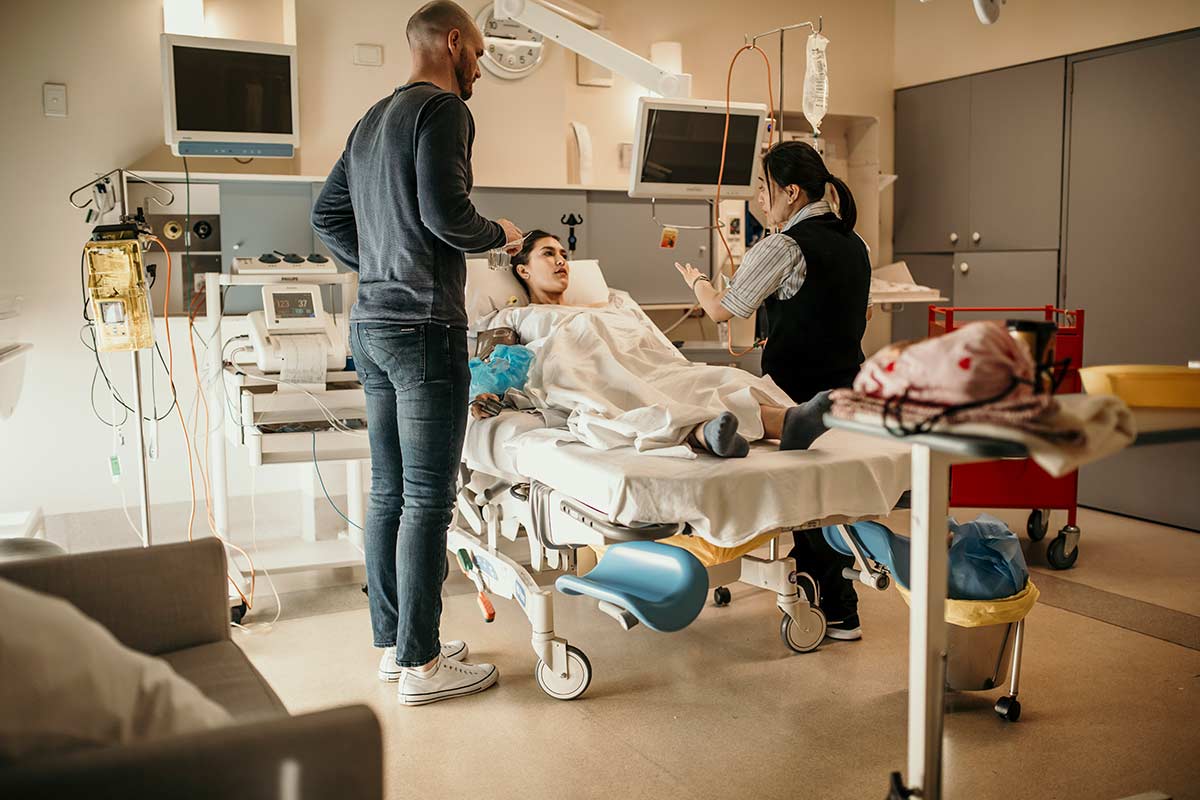A Birth Plan can be useful to help share your wishes for birth with your maternity team, no matter which way you are planning on having your baby. While this is called a plan, we know that babies can sometimes make their own plans that see their birth take a different turn.
There are times where your obstetrician or midwife may recommend taking necessary steps to either bring on your labour or intervene in the birthing process to help safely deliver your baby.
When considering what you may and may not like in your labour and birth, here are a few things that we do routinely or encourage.
- We encourage active labour including position changes and being upright and mobile. We have birth balls and mats for your use during labour, if you would like. Many women also find that a warm shower can help but Epworth does not facilitate water births or use of baths during labour.
- We respect your wishes about pain relief in labour. We appreciate that each woman will want something different from their labour and birth. If you want an early epidural or if you want to draw on HypnoBirthing techniques as a way to meet your baby, we are here to support you and make this a great experience for you.
- Episiotomies are not something we perform routinely and is only done if your obstetrician believes it is absolutely necessary to protect you or if your baby is in distress and needs to be born quickly.
- We do routinely administer a medication called oxytocics after your baby’s birth. This helps to minimise blood loss and to prevent your placenta being stuck in your uterus.
- We will always put your baby straight up onto your chest for skin to skin after birth when you have a vaginal birth.
- If you have a Caesarean section, we assist you to meet and hold your baby as soon as possible but generally do skin to skin once you get into recovery when it is not so cold for your baby. There is also more space in recovery for you to cuddle your baby properly on your chest. We know how important and special this time is for you and your baby. The only time this may not happen is if you don’t want to, or if your baby needs some help with its breathing after birth. If your baby requires that extra support, we will always bring it back to you as soon as possible.
- We are very good at looking for the cues that tell us your baby is ready to try breast feeding, if this is the way you choose to feed. The first feed usually happens in the first hour after birth and we will provide you all the support you need to have a great breastfeeding experience, if that’s how you choose to feed your baby.
- We will support you in feeding your baby whether you plan on breastfeeding, formula feed, or even use a combination of both. Just let our midwives know and we’ll tailor our care and education to suit your needs.
- If you need to be separated from your baby, we will always encourage your partner or support person to go with the baby, but it is not required and is up to you.
- Feel free to bring certain things from home that will help make you feel more comfortable. So if you want your own pillow or blankets or if you want to listen to your own music, feel free! Our midwives have even put together a Songs for the Birth Suite playlist for you.
If there or other things that you might be considering for your baby’s birth. It’s best to discuss these ideas with your obstetrician during your pregnancy as there may be clinical reasons related to your pregnancy that means that you need to rethink your plans. Once you and your obstetrician have discussed and agreed upon these, please put them into a birth plan for the midwives to see when you arrive.
These might include:
- Physiological third stage, where no oxytocin is given after the baby is born and the placenta is given time to deliver spontaneously. There are some risks involved with this and times where this wouldn’t be recommended.
- Delayed cord clamping. Most obstetricians will routinely wait until the cord stops pulsating until the cord is clamped and cut, but if this is especially important to you, this may be something you want to put in your birth plan.
- You are welcome to keep your placenta. If you are wanting to do, please let us know also so we can store it appropriately.
- If you don’t want your baby to have the routine injections given after birth. These are vitamin K and hepatitis B vaccination. We will ask for your written consent before it’s given to your baby, but if you don’t want your baby to have one or both of these, then please let us know.
- If you are having an elective Caesarean, you may want to assist in delivering your baby. This is called a maternally assisted caesarean (MAC). Not all obstetricians do this, so it is essential to discuss this prior to your birth.
- If there is anything specific you do or don’t want us to say during your labour or birth.
- If you have any cultural or religious requirements that you would like to follow during your labour and birth.
Just remember that the most important factors are the health and wellbeing of you and your baby and that it helps to remain flexible, no matter which turns your baby’s birth might take. We are always happy to work with you so, if there is something you can’t achieve, we will try and find a suitable alternative.
Getting back to being you - Wellness checklist
Planning for your pregnancy
Trimester 1 - Starting well
- Am I pregnant?
- Ask an Epworth Midwife
- Your due date
- Feeling queasy
- Taking care of you in trimester 1
Trimester 2 - Midway check-in
- Your second trimester
- Monitoring your pregnancy
- Baby movement
- Dealing with aches and pains
- Staying active during pregnancy
- Taking care of you in trimester 2
Trimester 3 - The big day
- What to pack in your hospital bag
- Your birth plan
- Your support team
- Getting ready to come to hospital
- Gen V research at Epworth

